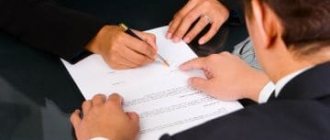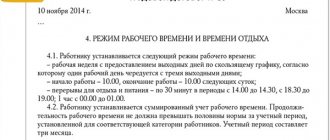Compliance with the requirements and regulations of labor legislation is inextricably linked with the proper implementation of government supervision. An employee’s rights will be fully respected when the employer knows that his activities are under control, and any violation of labor legislation may lead to appropriate sanctions.
That is why the federal labor inspectorate - in particular state labor inspectors (GIT) - play a large role in regulating the relationships that arise in the process of interaction between employee and employer.
State labor inspector: concept and role
Who is a state labor safety inspector?
Thus, the only guidance for GIT and FIT is the legislation of the Russian Federation.
The main purpose of the existence of such entities as FIT is to protect the rights of workers and labor protection in general. In addition to performing functions such as participating in investigations following an accident that occurred at work and insuring workers, the FIT also carries out supervisory functions and has control powers in relation to bankrupt organizations.
The authority of the GIT also includes checking compliance with safety requirements, which vary depending on the type of activity carried out by a particular organization. Moreover, the FIT's role is to provide advice to workers and employers on ways to more effectively comply with labor laws.
Thus, the activities of the State Labor Inspectorate are not limited solely to protecting the interests of the employee or restoring his rights, but are also aimed at creating and optimizing safe working conditions that meet all legal requirements by summarizing existing practice.
Article 358 of the Labor Code of the Russian Federation. Responsibilities of state labor inspectors (current version)
1. When exercising supervisory and control powers of the federal labor inspection, state inspectors act in accordance with the Constitution of the Russian Federation, the requirements of federal laws and other regulatory legal acts containing labor law standards. The list of such acts is given in Art. 5 TK.
First of all, state labor inspectors are guided by Art. 18 of the Law on the protection of the rights of legal entities and entrepreneurs. This norm obliges them:
— timely and fully fulfill the powers granted in accordance with the legislation of the Russian Federation to prevent, identify and suppress violations of mandatory requirements and requirements established by municipal legal acts;
— comply with the legislation of the Russian Federation, the rights and legitimate interests of the employer being inspected;
— carry out an inspection on the basis of an order or order from the head, deputy head of the relevant federal labor inspection body;
- carry out an inspection only during the performance of official duties, an on-site inspection only upon presentation of official identification, a copy of the order or order of the head, deputy head, the relevant body of the federal labor inspectorate and in the case provided for in Part 5 of Art. 10 of the Law, copies of the document agreeing to carry out the inspection with the prosecutor’s office;
- do not prevent the head (his deputy) of the inspected organization from being present during the inspection and giving explanations on issues related to its subject;
— provide the present manager (his deputy) of the organization being inspected with information and documents related to the subject of the audit;
— acquaint the head (his deputy) of the audited organization with the results of the audit;
— when determining the measures taken in response to detected violations, take into account the compliance of such measures with the severity of the violations, their potential danger to the life and health of workers, and also not allow unreasonable restrictions on the rights and legitimate interests of the employer;
— prove the validity of their actions when appealing them in the manner established by the legislation of the Russian Federation;
— comply with the inspection deadlines established by the Law;
— do not demand from the employer documents and other information, the presentation of which is not provided for by the legislation of the Russian Federation;
— before starting an on-site inspection, at the request of the manager (his deputy), familiarize him with the provisions of the administrative regulations (if any) in accordance with which the inspection is carried out;
— record the inspection performed in the inspection log.
In addition, state labor inspectors must take into account the provisions of departmental regulations adopted by the federal labor inspectorate.
2. Employment contracts concluded by the heads of the relevant state labor inspectorate with a person hired for the position of state labor inspector must include the established part 2 of Art. 358 of the Labor Code is the obligation to preserve state, official, commercial and other secrets protected by law received by a state labor inspector in the exercise of supervisory and control powers, as well as after leaving his position (see Article 57 of the Labor Code).
3. Part 2 of the commented article imposes on state labor inspectors the obligation to refrain from reporting to the employer information about an employee who has applied to the state labor inspectorate for the protection of his labor rights. This is necessary in order to prevent concealment of offenses, because workers often refuse to inform the federal labor inspectorate about violations of their labor rights, fearing a negative reaction from the employer.
Comment source:
Rep. ed. Yu.P. Orlovsky “COMMENTARY ON THE LABOR CODE OF THE RUSSIAN FEDERATION”, 6th edition ACTUALIZATION
ORLOVSKY Y.P., CHIKANOVA L.A., NURTDINOVA A.F., KORSHUNOVA T.YU., SEREGINA L.V., GAVRILINA A.K., BOCHARNIKOVA M.A., VINOGRADOVA Z.D., 2014
FUNCTIONS AND TASKS OF LABOR INSPECTION
The Federal Labor Inspectorate carries out state supervision and control over compliance with labor legislation and other regulatory legal acts containing labor law standards by all employers on the territory of the Russian Federation (Article 353 of the Labor Code of the Russian Federation).
The Federal Labor Inspectorate is not a specific body, but a centralized system, which, in turn, consists of the following services:
- federal executive body authorized to carry out state supervision and control over compliance with labor legislation and other regulatory legal acts containing labor law norms. Such a body is the Federal Service for Labor and Employment (Rostrud);
- territorial bodies of Rostrud (state labor inspectorates).
Each subject of the Russian Federation has its own state labor inspectorate.
Inspectors of these federal labor inspectorates conduct inspections of employers' compliance with labor laws.
The main powers of the federal labor inspectorate are established by Article 356 of the Labor Code of the Russian Federation and are as follows:
- implementation of state supervision and control over employers' compliance with labor legislation and other regulatory legal acts containing labor law norms, through inspections, surveys, issuing binding orders to eliminate violations, drawing up protocols on administrative offenses within the scope of authority, preparing other materials (documents) on bringing the perpetrators to justice in accordance with federal laws and other regulatory legal acts of the Russian Federation;
- analysis of the circumstances and causes of identified violations, taking measures to eliminate them and restore the violated labor rights of citizens;
- carrying out, in accordance with the legislation of the Russian Federation, the consideration of cases of administrative offenses;
- sending, in the prescribed manner, relevant information to federal executive authorities, executive authorities of constituent entities of the Russian Federation, local government bodies, law enforcement agencies and the courts;
- exercising supervision and control over compliance with the established procedure for investigating and recording industrial accidents;
- generalization of application practice, analysis of the causes of violations of labor legislation and other regulatory legal acts containing labor law norms, preparation of appropriate proposals for their improvement;
- analysis of the status and causes of industrial injuries and development of proposals for their prevention, participation in the investigation of industrial accidents;
- taking the necessary measures to attract qualified experts in the prescribed manner in order to ensure the application of the provisions of labor legislation and other regulatory legal acts related to the protection of the health and safety of workers during their work, as well as obtaining information on the impact of the technologies used, materials and methods used on the health status and worker safety;
- request from federal executive authorities and their territorial bodies, executive authorities of constituent entities of the Russian Federation, local governments, prosecutors, judicial authorities and other organizations and obtain from them free of charge the information necessary to perform the tasks assigned to it;
- receiving and considering applications, letters, complaints and other requests from citizens about violations of their labor rights, taking measures to eliminate identified violations and restore violated rights;
- informing and consulting employers and employees on issues of compliance with labor legislation and other regulatory legal acts containing labor law standards;
- informing the public about identified violations of labor legislation and other regulatory legal acts containing labor law norms, conducting explanatory work about the labor rights of citizens;
- preparation and publication of annual reports on compliance with labor legislation and other regulatory legal acts containing labor law norms, submitting them to the President of the Russian Federation and the Government of the Russian Federation in the prescribed manner;
- exercising supervision and control over the implementation of workers’ rights to receive benefits under compulsory social insurance against accidents at work and occupational diseases, as well as over the appointment, calculation and payment of temporary disability benefits at the expense of employers.
In addition, the Federal Labor Inspectorate:
- sends to the national accreditation body a proposal to suspend the accreditation certificate of an organization conducting a special assessment of working conditions and violating the requirements of the legislation on special assessment;
- sends to the federal executive body, which carries out the functions of developing state policy and legal regulation in the field of labor, a proposal to cancel the expert’s certificate for the right to perform work on a special assessment of working conditions in connection with the violation of the legislation on the special assessment of working conditions committed by this expert;
- sends information to the relevant government authorities about violations, actions (inaction) or abuses that are not subject to labor legislation and other regulatory legal acts containing labor law norms.
Direct control over compliance with labor legislation is carried out by labor inspectors (GIT inspectors).
The most relevant powers of labor inspectors for employers are:
- conducting inspections of employers' compliance with labor laws,
- issuing mandatory orders for employers to eliminate violations,
- drawing up protocols on administrative violations,
- consideration of cases of administrative offenses.
A certain list of responsibilities for labor inspectors has also been established.
State labor inspectors are obliged (Article 358 of the Labor Code of the Russian Federation):
- comply with the legislation of the Russian Federation, the rights and legitimate interests of employers - individuals and employers - legal entities (organizations);
- keep secrets protected by law (state, official, commercial and other) that became known to them during the exercise of their powers, as well as after leaving their position;
- consider absolutely confidential the source of any complaint about shortcomings or violations of the provisions of labor legislation and other regulatory legal acts containing labor law norms;
- refrain from informing the employer of information about the applicant if the inspection is carried out in connection with his appeal, and the applicant objects to informing the employer of information about the source of the complaint.
Other
Main tasks of state control
The main tasks of state supervision include:
- prevention and suppression of violations of mandatory requirements of state standards, rules of mandatory certification and the Law of the Russian Federation “On the Unity of Measurements” by all business entities;
submission of information to executive authorities and public organizations based on the results of inspections.
Who carries out the control?
State supervision is carried out by officials of Gosstandart and its subordinate centers of standardization and metrology, which have received the status of territorial bodies of state supervision - state inspectors .
Also, the State Inspectorate for Trade , Quality of Goods and Protection of Consumer Rights (Gostraginspektsiya) monitors the quality and safety of consumer goods.
Home → Territory protection → Responsibilities of state inspectors
Responsibilities of government inspectors
Article 34. Rights of officials of bodies and state institutions exercising state supervision in the field of protection and use of specially protected natural areas
(Name as amended, put into effect on November 15, 2014 by Federal Law of October 14, 2014 N 307-FZ.
1. Officials of bodies and state institutions exercising state supervision in the field of protection and use of specially protected natural areas, in the manner established by the legislation of the Russian Federation, have the right:
(Paragraph as amended, put into effect on November 15, 2014 by Federal Law of October 14, 2014 N 307-FZ.
a) request and receive information and documents related to compliance by legal entities, individual entrepreneurs and citizens with the requirements of the legislation of the Russian Federation on specially protected natural areas;
b) freely, upon presentation of an official ID and a copy of the order (instruction) of the head (deputy head) of the state supervision body (state institution) on the appointment of an inspection, visit buildings, premises, structures and other similar objects located in specially protected natural areas, conduct their inspections, and also conduct research, tests, examinations, investigations and other control activities;
(Subclause as amended by Federal Law of December 28, 2013 No. 406-FZ; as amended by Federal Law of October 14, 2014 No. 307-FZ.
c) issue orders to legal entities, individual entrepreneurs and citizens to eliminate identified violations of the requirements of the legislation of the Russian Federation on specially protected natural areas, to take measures to ensure the prevention of harm to animals, plants and the environment, and compliance with the regimes of specially protected natural areas;
d) draw up protocols on administrative offenses related to violations of the legislation of the Russian Federation on specially protected natural areas, consider cases of these administrative offenses and take measures to prevent such violations;
e) send to the authorized bodies materials related to violations of the legislation of the Russian Federation on specially protected natural areas in order to resolve issues of initiating criminal cases based on crimes;
f) bring claims to individuals and legal entities to recover funds in favor of state nature reserves and national parks to compensate for damage caused to natural complexes and objects of state nature reserves and national parks as a result of violations of the established regime of state nature reserves and national parks.
2. Officials of bodies and government institutions authorized to carry out state supervision in the field of protection and use of specially protected natural areas, who are state inspectors in the field of environmental protection, in the manner established by the legislation of the Russian Federation, when carrying out control measures in specially protected natural areas territories also have the right:
(Paragraph as amended, put into effect on November 15, 2014 by Federal Law of October 14, 2014 N 307-FZ.
a) request, for inspection purposes, from citizens located in the territories of state natural reserves and national parks, permission to stay in these specially protected natural areas;
b) request, for the purpose of verification, from legal entities and individual entrepreneurs documents for the right to carry out environmental management and other activities in the territories of protective zones adjacent to the territories of state natural reserves and national parks;
c) detain in the territories of state natural reserves, national parks and their protective zones citizens who have violated the legislation of the Russian Federation on specially protected natural areas, and deliver these citizens to law enforcement agencies;
d) carry out inspections of vehicles and personal belongings of citizens in the territories of state natural reserves, national parks and their protective zones;
e) confiscate from citizens who have violated the legislation of the Russian Federation on specially protected natural areas, products and tools for illegal use of natural resources, vehicles and relevant documents.
3. State inspectors in the field of environmental protection, when performing their official duties, also enjoy the rights of officials exercising federal state forest supervision (forest protection) established by the forestry legislation of the Russian Federation.
(Clause as amended by Federal Law of March 12, 2014 N 27-FZ; as amended by Federal Law of October 14, 2014 N 307-FZ.
4. State inspectors in the field of environmental protection have the right, in the manner established by the legislation of the Russian Federation, to use special means when performing their official duties - handcuffs, rubber truncheons, tear gas, devices for forcibly stopping transport, and service dogs.
(Clause as amended, put into effect on November 15, 2014 by Federal Law of October 14, 2014 N 307-FZ.
5. State inspectors in the field of environmental protection, when carrying out the tasks assigned to them by this Federal Law and in the performance of official duties, are permitted, in the manner established by the legislation of the Russian Federation, to store, carry and use service firearms.
(Clause as amended, put into effect on November 15, 2014 by Federal Law of October 14, 2014 N 307-FZ.
6. State inspectors in the field of environmental protection are provided with body armor and other personal protective equipment.
(Clause as amended, put into effect on November 15, 2014 by Federal Law of October 14, 2014 N 307-FZ.
7. State inspectors in the field of environmental protection are subject to compulsory state insurance in accordance with the legislation of the Russian Federation.
(Clause as amended, put into effect on November 15, 2014 by Federal Law of October 14, 2014 N 307-FZ.
8. Bodies and federal state budgetary institutions exercising state supervision in the field of protection and use of specially protected natural areas and their buffer zones may be attracted by the court to participate in the case or have the right to intervene in the case on their own initiative to give an opinion on a claim for compensation for damage damage caused to the environment and its components due to violation of the requirements of the legislation of the Russian Federation on specially protected natural areas.
(Clause as amended, entered into force on December 30, 2013 by Federal Law of December 28, 2013 N 406-FZ.
(Article as amended, put into effect on August 1, 2011 by Federal Law of July 18, 2011 N 242-FZ.
The rights and responsibilities of state inspectors are determined by the Law “On Standardization”
The state inspector has the right:
- free access to the office and production premises of the inspected enterprise (organization) , receive all necessary documentation, carry out sampling and sampling, issue orders to eliminate identified deviations, prohibit or suspend the supply (sale) of products that do not meet the mandatory requirements of state standards, as well as in case of refusal to present it for inspection;
- Based on the results of inspections, impose fines on violators of mandatory requirements of standards. Severe punishment is also applied to those who do not comply with the ban on sales - a fine in the amount of the cost of products sold. The ban on the sale of products or services if they do not comply with the mandatory requirements of Russian regulatory documents also applies to imported products (services), especially if they have not been certified in accordance with Russian legislation;
- send the necessary materials to the arbitration court , the prosecutor's office or the court, if the orders or decisions issued by them are not fulfilled by the enterprise - the object of state supervision.
Article 355. Principles of activity and main tasks of the federal labor inspectorate
The activities of the Federal Labor Inspectorate and its officials are carried out on the basis of the principles of respect, observance and protection of human and civil rights and freedoms, legality, objectivity, independence and transparency.
The main tasks of the Federal Labor Inspectorate are:
ensuring compliance and protection of labor rights and freedoms of citizens, including the right to safe working conditions;
ensuring compliance by employers with labor legislation and other regulatory legal acts containing labor law standards;
providing employers and employees with information on the most effective means and methods of compliance with the provisions of labor legislation and other regulatory legal acts containing labor law norms;
bringing to the attention of the relevant government authorities facts of violations, actions (inaction) or abuses that do not fall under the scope of labor legislation and other regulatory legal acts containing labor law norms.
back to contents
Regulatory acts regulating the activities of the inspection
The activities of the labor inspectorate are determined and regulated by:
- Part 1 of Article No. 353 of the Labor Code (LC) of the Russian Federation;
- Regulations on the Federal Service for Labor and Employment No. 324 of June 30, 2004;
- Government Decree No. 156 of 04/06/2004;
- Model Regulations on the territorial body of the Federal Service for Labor and Employment, approved by Order No. 678n dated July 1, 2009;
- Regulations of the Federal Service for Labor and Employment, approved by Order of Rostrud No. 211 of September 11, 2007;
- Geneva Convention No. 81 of July 11, 1947, ratified in Russia by Federal Law (FZ) No. 58 of April 11, 1998;
- Federal Law No. 294 dated December 26, 2008;
- Federal Law No. 59 dated May 2, 2006.
Labor inspection is a centralized system consisting of a federal body and its regional divisions, otherwise called state inspectorates. The activities of the inspectorate at the federal level are led by the Chief State Labor Inspector of the Russian Federation. The powers of the chief federal inspector are regulated by Art. 353 of the Labor Code, as well as the activities of the entire inspection system.
Read about what documents the labor inspectorate checks during an inspection here.






